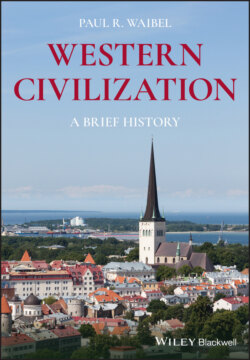Читать книгу Western Civilization - Paul R. Waibel - Страница 52
Disintegration of the Carolingian Empire
ОглавлениеOn September 11, 813, Charlemagne crowned his eldest son, Louis, emperor. Louis ruled as co‐emperor with his father until the latter's death in January, 814. Charlemagne recognized that when Pope Leo III crowned him emperor on Christmas Day, 800, it appeared that the title was the pope’s to bestow on whomever he chose. Was the emperor subject to the pope? Charlemagne's crowning of his son, without consulting the pope, was one way of clarifying the relationship between secular and papal authority. Louis, however, allowed himself to be crowned a second time by Pope Sylvester IV (816–817) in October 816, as if to say that he was not truly emperor until given the pope's blessing.
Louis proved to be an ineffective ruler. Lacking his father's ability to inspire awe, his reign was marked by war between his four sons and among the Frankish nobility. Upon his death in 840, his three surviving legitimate sons fought over the division of the empire. The two younger sons, Charles the Bald (823–827) and Louis the German (c. 804–876), joined forces against their older brother, Lothair I (795–855), who inherited the imperial title and attempted to hold the empire together.
Charles the Bald and Louis the German met together with their armies at Strasbourg in February 842. The two brothers swore an oath of unity against their older brother. The oath was taken in the vernacular languages of their followers: “romana lingua,” the precursor of modern French, and “teudisca lingua,” the precursor of modern German. It was already evident by the middle of the ninth century that there were two distinct languages and cultures emerging that would evolve into modern France and Germany.
The Treaty of Verdun was concluded between the three brothers in August 843. It divided the administration and territory of the Carolingian Empire between the three. Charles the Bald was given the French speaking western Frankish lands, roughly medieval France. Louis the German was given the German speaking eastern Frankish lands. Lothair retained the imperial title and control of the so‐called “Middle Kingdom,” a strip of territory stretching from the North Sea to northern Italy. When Lothair died in 855, his lands were divided, according to Frankish custom, between his three sons. From its creation to middle of the twentieth century, the territory given to Lothair was fought over by the heirs of Charles and Louis.
